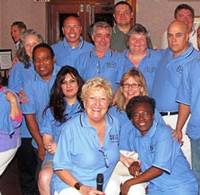Ellicott Dredges 125th Anniversary

Ellicott Dredges, founded in 1885, celebrated its 125th anniversary by taking a dinner cruise around the Port of Baltimore aboard the turn of the century paddlewheel riverboat The Black-Eyed Susan. The Port (which Ellicott's predecessors helped create in the 1700s with the first dredge, a two horse power-driven machine) has written a feature story about Ellicott Dredges in the latest edition of its magazine. The article appears in the September/October 2010 issue. Almost 150 people celebrated Ellicott's 125th anniversary including employees…
Secretary Locke Announces ARRA Awards
On August 20, Commerce Secretary Gary Locke will announce millions of dollars of American Recovery and Reinvestment Act (ARRA) funding to strengthen the economy, create jobs, and support safe and efficient marine commerce and trade, which contributes more than $742b and 13 million jobs to the economy annually. The awarded contracts will help the Commerce Department’s National Oceanic and Atmospheric Administration (NOAA) map the seafloor, collect data in critical coastal areas, and update nautical charts of approximately 2,000 square nautical miles in the Chesapeake Bay and other areas along the Atlantic, Pacific and Gulf of Mexico. The announcement will occur on August 20, 11:15 a.m. at the Half Moone Cruise & Celebration Center, Virginia Room, 1 Waterside Drive, Norfolk, Va. 23510.
Washington State Ferries to Shift to Clean Fuel Initiative
Washington State Ferries (WSF)/Washington State Department of Transportation (WSDOT) will shift the entire ferry fleet to low-sulfur diesel fuel, test ultra-low sulfur diesel fuel, and test biodiesel fuel—all steps that will improve air quality by reducing the amount of harmful substances in the ferries’ diesel fuel exhaust. The ferry system also has upgraded its vessels with more-efficient engines and made operational changes that have reduced fuel consumption and emissions, and will continue seeking new ways to improve fuel efficiency. As a result of all these changes, nearly 10,000 fewer tons of pollutants will be released into the air by ferry fuel emissions.
Oil Match Confirmed in Dalco Passage Spill
Gov. Gary Locke and RADM Jeffrey Garrett announced today that tests conducted by both state and federal laboratories indicate the Polar Texas oil tanker, owned by ConocoPhillips, is the source of the oil that soiled beaches around Dalco Passage in October. State and federal investigators say oil samples connected to the Polar Texas match oil from the spill. "We have a match, which makes us confident that we know the source of the oil spill," Locke said. "I applaud the hard work and focus of our men and women in bringing the investigation to this point," said Garrett. The spill of about 1,000 to 1,500 gallons was first discovered in the early-morning hours of Oct. 14, but response efforts were hampered by darkness, bad weather and incomplete information. The U.S.
Spill Prevention and Response Protocols Formalized
The Thirteenth U.S. Coast Guard District and Washington state (Ecology) have formalized protocols for improved coordination of their oil pollution prevention and response efforts in Washington state waters. Capt. Myles Boothe, Chief, 13th Coast Guard District Marine Safety Division; and Dale Jensen, Ecology’s spills program manager, signed the protocols last Friday at the 13th Coast Guard District office. In May 2001, Governor Gary Locke and USCG Rear Adm. Erroll M. Brown signed a Memorandum of Agreement to work together to achieve a coordinated and efficient working relationship. The new protocols for Washington waters apply to all oil spill incidents and include information sharing…
Are Fast Ferries Too Fast?
British Columbia's fast ferries may be too fast for their own good, according to CANOE columnist Jim Hume. The British Columbia Ferry Corporation first sailed The Explorer on June 17, 1999, with regular service from Vancouver Island (Nanaimo) to Mainland (Horseshoe Bay) starting July 1. While the fast-cats can operate faster than traditional ferries, they are currently only shaving off 14 minutes of their scheduled run, not the 25 minutes promised. It turns out when the fast boat operates at top speeds in the confined waters of its scheduled route, it raises six-ft. waves along the shore. Additionally, high-speed fast ferry Snohomish, built by Dakota Creek Industries, Inc.
New Budget Focus: Safety, Passenger Ferries
The two-year budget for the Washington State Ferries system approved in the spring by the state Legislature will create a modern fleet of passenger-only ferries and terminals to help move more people across Puget Sound. But the new spending plan also represents a significant investment in two other key areas: renovating older terminals and expanding safety programs throughout the fleet. The budget is broken down into two areas: the $303 million operating budget, which covers the day-to-day operations at WSF, and the $287 million capital budget, which addresses construction needs. In the capital budget, $116 million came from voter-approved Referendum 49 funds.





